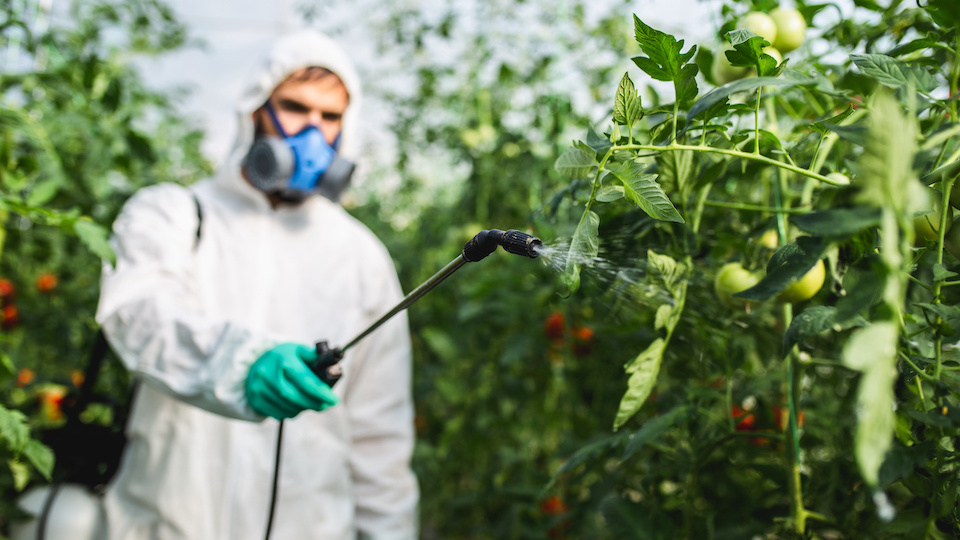Yes, I get it; pests can be a problem. In just a few hours, pests gone wild can destroy your beautiful cabbage crop, annihilate your cucumbers, and leave your lettuce looking like it went through a war. All of this is heartbreaking, and I have had it happen to me more than once. There is a solution to this problem, and it is not to pour a vat of toxic chemicals into your garden either. Once I got the formula down – the best method to repel nasty pests – my garden has never been so beautiful. If I can do it, so can you.
What exactly are pesticides?
Before we talk about the solution to a pest-free garden, we need to talk about the dreaded “P” word. In short, pesticides kill living things – the word “Cide” means to kill. According to those that make pesticides, these toxins will eventually be broken down by microorganisms in the soil. This is only true if we have healthy soil – loaded with happy microbes. However, the number of healthy microbes has diminished because of all of the “Cides” – pesticides, herbicides, fungicides, etc. that are used to kill living things. If your neighbor is using these toxins, your soil suffers. Even when it rains, pesticides are carried thousands of miles. Garden pesticides demonize plants even to the point where protein synthesis comes to a halt, and the soluble nitrogen and sugars increase, calling all predators to eat.
Animals, who we depend on for fertilizing and dispersing seeds and pollinators like birds, bees, and butterflies, are hurt by pesticides – even so much as bees are suffering from colony collapse disorder.
Almost all of the rivers in North America are tainted with pesticides, along with many of our wells. Lakes and rivers are becoming undrinkable and unfishable, too.
The solution is not a lack of pesticides
Here is an interesting way to think about pesticides. They are like pharmaceuticals for plants. When you have a headache, is it because you have an aspirin deficiency, or is your body trying to tell you something? When pests are attracted to your garden, it is not because you have a pesticide deficiency either. The most important thing to do is find the main reason why the pests are there – just like finding out why you might have a headache. Bandaid solutions don’t work – they just cover up the real problem and never get to the source.
How to stop a pest problem for good
Here are some lessons I have learned over the years after much trial and error. I am happy to report that I don’t really ever have issues with pests as long as I keep these things in mind.
- Give plants room to breathe – Over-planting results in too little airflow. Air circulation is necessary for healthy plants. If plants are too close together, with no room to breathe, insects will come for shelter and protection from predators. They set up shop in your garden and raise their young who happily dine on the garden plants. A little space between plants will make all the difference.
- Water in the early morning – When you water early in the morning before the sun gets too high in the sky, plants are better hydrated and able to withstand warmer temperatures. Dehydrated plants are stressed plants, and stressed plants attract pests. Watering in the morning gives leaves time to dry before the evening comes. Insects are drawn to damp plants – especially slugs, earwigs, and snails. It is best to water deeply a couple of times a week rather than just getting the soil’s surface and leaves wet. Keep in mind that annual plants require more water (they have shallow roots) and plants in containers.
- Feed your soil – Make it a habit to test your garden soil and amend it as needed. Working a few inches of rich compost into the soil annually helps build up the number of beneficial bacteria and improve the soil structure. Healthy soil is necessary for strong and healthy plants – remember- pests prey on sick plants, so the healthier your plants, the less risk of pests. Use only organic material to amend your soil.
- Don’t fall behind on your harvesting – When fruit falls off the vine and lands in your garden, it is a blinking target for hungry pests. Overripe fruit still on the vine causes the whole plant to decline and become weak which also calls out to pests. Clean up any fallen fruit and harvest regularly to keep your garden and plants healthy.
- End of season clean-up – Just like keeping your garden clean throughout the growing season, a final clean-up is a must for a healthy garden the following season. Remove all plant material and debris. If possible, plant a fall cover crop in your garden that will help return valuable nutrients to the garden soil.
- Crop rotation – Not planting the same thing in the same garden spot each year helps keep insect pests away. Rotating crops can return nutrients to the soil and break up pest and disease cycles, which means healthier plants.
- Feed plants organically – Fertilize garden plants during the growing season to keep their natural defenses sharp. Use things like bonemeal, fish-emulsion, worm tea, eggshells, coffee ground, soybean meal, and seaweed. Never use chemical fertilizers.
Remember, healthy plants start with healthy soil, and you always get what you put into your garden. While pesticides may seem like a quick and effective fix, they set you up for weak plants and a small harvest year after year!
Happy Growing,
-Susan Patterson, CBHC and Master Gardener



